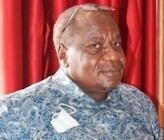
Dr. Paul A. Opondo,
Spokesperson and Principal Investigator, Research Section, Affiliations
Out of the desire to maximize economic gains and to strategically position themselves in the unfavorable world economic system, most African countries upon attaining independence, moved quickly to embrace regional economic integration as one of the desirable vehicles to this end (Linn and Oksana, 2008). Egged on by the newly formed Organization of African Unity (OAU), discussions that divided Africa into possible six economic blocks followed (Qobo, 2007). Currently the African Union (AU) recognizes eight Regional Economic Corporations in the continent, a clear testimony of the perceived usefulness of Integration (AU, 2019). The African Union on its part treats these RECs as the building blocks for the anticipated African Economic Community. However, the successes of the RECs are hardly impressive even for those that have lasted for over four decades such as the Economic Community of West African States (ECOWAS) (Qobo, 2007). Volumes of literature have been dedicated to uncovering and analyzing economic and policy factors that have contributed to the dismal achievements by these RECs even though there is a consensus that they are indeed desirable (Nye 2004, Etzioni, 1962, Trudi, 2011). The markets have not been fully integrated, governance and decision making remains a challenge while many stated objectives are far from being realized. The vexed question of state sovereignty and overlapping membership remain huge obstacles to the full realization of the fruits of integration for many countries. It is therefore important to attempt to understand why RECS as political, economic and social affiliations have not achieved many of their stated goals and how these obstacles and challenges can be overcome. This Research Section proposes to assess the performance of the frameworks of regional integration in Eastern and Southern Africa. In doing so, the RS will analyze the architecture of interactive markets, governance and decision making, and human rights protection.
spokesperson and Principal Investigator:
Members
Dr. Bramwel Matui
Dr. Paul Kurgat
Dr. Prisca Tanui Too
Ms. Linda Khaemba
Mr Vincent K Mutai
Mr. Maurice Oduor
Henry J Lugulu,(Law)
